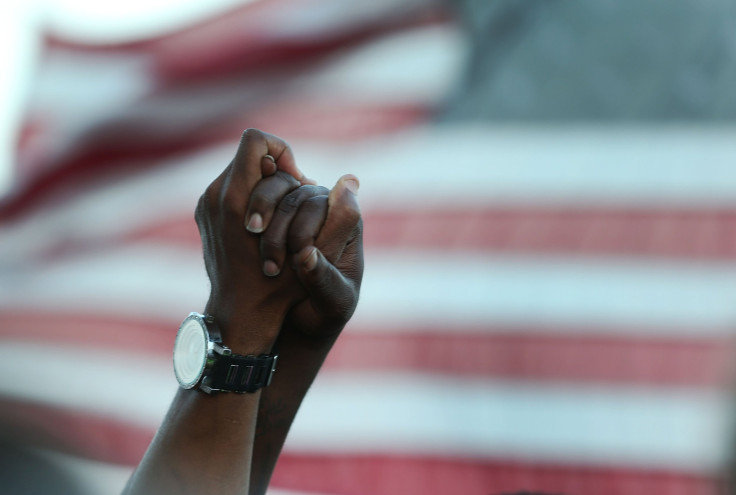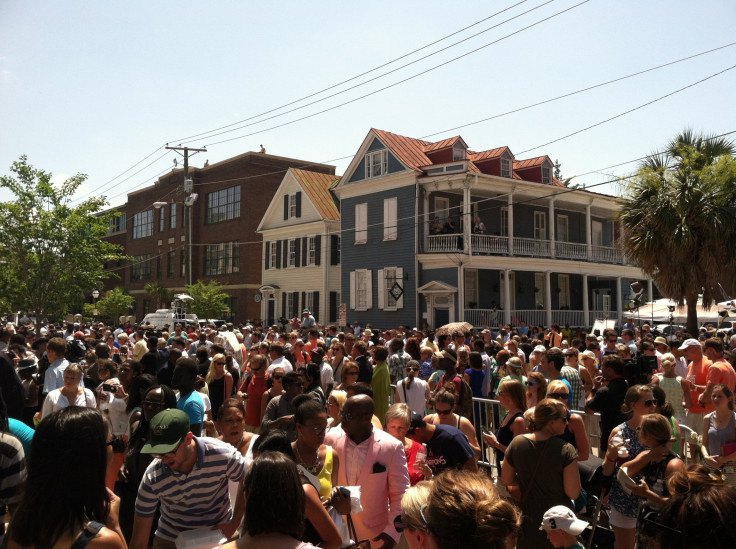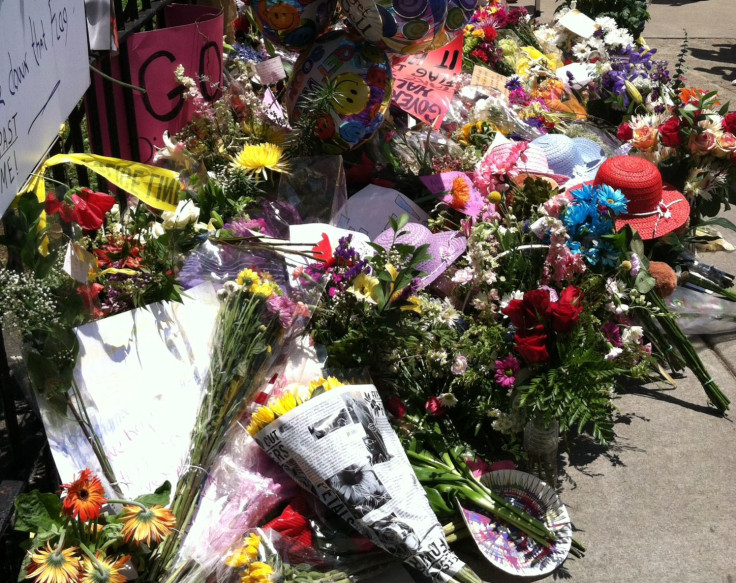Mother Emanuel Church Reopens After Shooting, Renews Hope For Race Conversations

CHARLESTON, South Carolina -- Amid sun, sweat and tears, hundreds gathered Sunday outside the Emanuel African Methodist Episcopal Church in downtown Charleston, their dresses, shirts and parasols forming a vivid sea of oranges, pinks, greens and blues that occasionally swayed in unison when the sermon, broadcast on speakers outside the church, turned to song. It was the first service for the historic church after a white man gunned down nine of its members, all of them black, during a bible study Wednesday evening.
The outpouring of support from people of all races, many of whom were not members of Emanuel AME, touched many in attendance, who were determined that Wednesday's tragedy grow into an opportunity for the community, the state and the country to overcome an entrenched reluctance to talk about racial issues even as others expressed skepticism the shooting could become such a catalyst.
"This is a chance for everyone on both sides to have those conversations that nobody wants to talk about," said Samira Owens, 23, a graphic designer who works three blocks away from the church but is not one of its members. "If we don't have those conversations, we're just going to continue to run into those types of issues."
Accused killer Dylann Roof, 21, who also purportedly left a manifesto espousing racism, was not from Charleston. Details about his background remain sketchy, but his last known address was in Eastover, a tiny rural community in central South Carolina about 100 miles from Charleston.
Records show during his short-lived high school career, Roof attended two different schools, one of them in Lexington County where residents still fly the Confederate flag, regarded by many as a symbol of racism and oppression. Roof, who is seen in pictures carrying the rebel flag, spoke chillingly before opening fire in Wednesday's attack, “You rape our women and you're taking over our country. And you have to go.”
"As tragic as this is, hopefully their lives weren't taken in vain," said Stanley Williams, a visitor from Summerville, 25 miles northwest of Charleston, who traveled to the church Sunday to honor the victims. "Maybe there's a greater good on the other side."

The Heaviest Price
In a tree-shaded area beside a white picket fence enclosing a playground beside the church, Williams and his wife, Patricia, both of whom are black, listened to the Rev. Norvel Goff, presiding elder of the AME Church in neighboring Edisto, deliver the Sunday sermon. The church, a white building with a sturdy spire, is located in an increasingly gentrified area of downtown Charleston
"There's still pain and hurt and anguish, but there's forgiveness," Williams said of sentiments among the black community. Tragic as it was, the shooting presented a chance for dialogue "we've overlooked," he reflected. "There's been a lot of missed opportunities," he added, peering over the tops of his glasses as he leaned on the white picket fence, gesturing with a pale blue handkerchief.
Although he suggested that certain things, like gun laws, would remain unchanged by the shooting, Williams was hopeful that it would at least jolt people awake. "At least now everybody's willing to listen," he said.
Yet specifics on what such a conversation would entail, where and how they would take place, who would responsible for organizing them and who would join in were lacking. For Williams, the dialogue meant addressing the issue of the Confederate flag, which still flies high alongside the State House, as well as de facto segregation in South Carolina schools. For Owens, it meant that people needed to discuss their personal views on race and learn how others felt.
Still, to some, the gathering of hundreds outside the church Sunday was a triumph in itself. "He thought he was going to separate us, divide us," Mae Powell, a grandmother from Atlanta who had traveled to Charleston for a previously scheduled family reunion, said, referring to accused killer Roof. She was not a member of the church but visited Sunday with her children and grandchildren so they could learn that love was more powerful than hate, she said.
"But he brought us together. Look at us," she exclaimed, gesturing toward the crowd that blocked Calhoun Street, in front of the church. On the concrete sidewalk, bouquets formed a thick layer that spread ever wider as people continued to deposit flowers. Hand-written posters, framed photographs and children's drawings lay interspersed among the blossoms.

Difficult Questions
But Powell's daughter, Candace Powell, was not optimistic about what impact the shooting could have. "I don't know how we are going to be able to move forward," she said, arguing such events had become the norm for the black community.
"We've been terrorized since we've been here," she said, referring to Africans who were brought to the United States as slaves. Racism was a learned behavior, and "until people stop teaching hate, until the people who feel that way are all gone, it's not going to change," Candace Powell added.
Nat, an older black gentleman who declined to provide his last name, listened to the sermon from outside the church and was doubtful Wednesday's shooting would lead to the change others hoped to see. "It takes a whole lot of things to have an impact," he said cautiously.
The Rev. Patricia Mitchell Marzett of Macedonia AME, a sister church just down the street from Emanuel AME, who sat in church for Sunday's sermon, said the shooting was indeed an opportunity to have a heartfelt conversation about race relations even as she pointed to deeply entrenched assumptions she saw as being at the core of the issue.
"For the people who are afraid of African-Americans: Why?" she asked.
As for the community around the church, healing from the shooting is a painstaking process, one that has barely started just days after the massacre. Gail Lincoln and Earline Lincoln White, sisters who were born and raised in Charleston and who are members of Macedonia AME but attended Sunday's service at Emanuel AME, said they knew many of the victims.
"Everyone was affected by it," Gail said. "We take it one day at a time."
During the service, Jody Malone, 59, a Charleston local who works nearby as a bridge operator, stood directly outside the church, toying with pink and purple sunglasses. Not a member of Mother Emanuel, she choked up as she spoke of the victims' families and the pain they were going through, and she insisted that the community would remain whole. "It's brought people together," Malone, who is white, said of the shooting. "This is not going to bring Charleston to its knees."
© Copyright IBTimes 2025. All rights reserved.






















